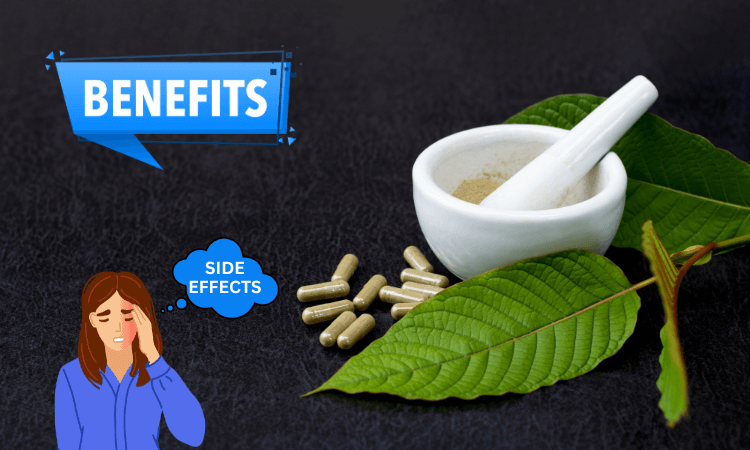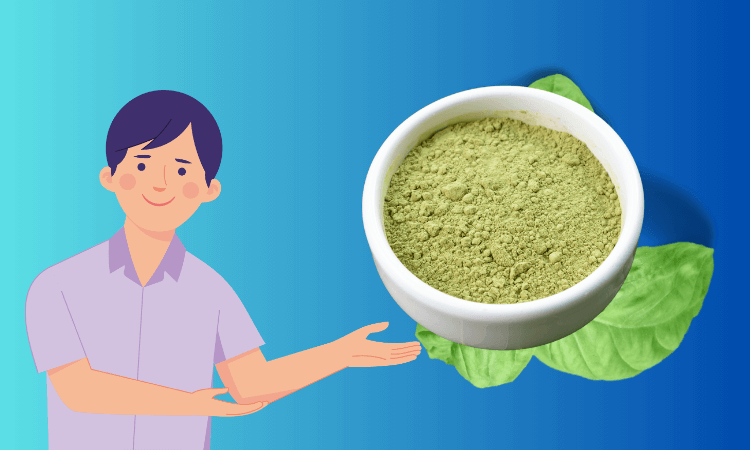Kratom, also known as Mitragyna Speciosa is a native plant of Southeast Asia known for its unique health and well-being benefits. There are different types of kratom strains available in the market and each strain provides different benefits. Most of the people prefer using kratom to reduce pain, improve mood, boost energy, and other purposes. But before start using kratom products it is necessary to know about their benefits and side effects. In this article, we have included the detailed health benefits and side effects of kratom.
Potential Health Benefits of Using Kratom Supported by Scientific Studies:
Here are the potential health benefits of using kratom, supported by scientific studies.

1. Pain Relief:
One of the most popular benefits of kratom is its ability to relieve pain. There are active compounds in kratom mitragynine and 7-hydroxy mitragynine. These active compounds interact with opioid receptors in the brain which can reduce the pain.
- Study Evidence: A study published in the Journal of Medicinal Chemistry state that these compounds act as partial agonists at the mu-opioid receptors. These are similar to opioid painkillers but with a lower risk of respiratory depression.
2. Energy Boost and Improved Focus:
At lower doses, Kratom is known to have stimulating effects. This can help you increase energy levels and improve focus. This makes kratom a popular and natural alternative to caffeine.
- Study Evidence: Research published in the Journal of Ethnopharmacology found that mitragynine, can enhance locomotor activity in animal models.
3. Mood Enhancement:
Kratom also has mood-enhancing properties. Many users claim that it helps them reduce symptoms of anxiety and depression. So, kratom can help you improve your overall sense of well-being.
- Study Evidence: A survey study conducted by Johns Hopkins University found that some users with mood disorders got positive outcomes after using kratom. This study shows that Kratom’s effects on mood could be due to its interaction with serotonin and dopamine receptors.
4. Opioid Withdrawal Aid:
Kratom is mostly being used to manage the opioid withdrawal symptoms. (Opioid withdrawal occurs when a patient who is dependent on opioids suddenly reduces or stops taking opioids). Kratom has the ability to bind with opioids without any respiratory depression. This makes kratom a safer alternative to overcome opioid addiction.
- Study Evidence: A comprehensive review in the International Journal of Drug Policy reported that Kratom could reduce the severity of withdrawal symptoms in opioid-dependent individuals. The study highlighted user reports of reduced cravings and withdrawal discomfort, supporting Kratom’s potential role in addiction treatment.
5. Potential Cognitive Benefits:
Some evidence says that kratom can help to enhance cognitive functions such as memory, focus, and motivation.
- Study Evidence: Primary findings in a study published in the Asian Journal of Psychiatry indicated that Kratom users experienced improved cognitive function and mental clarity. However, the study called for more rigorous clinical trials to confirm these effects.

Common and Rare Side Effects of Using Kratom:
Kratom is an herbal product used for various medicinal and recreational purposes. Despite of its numerous benefits, Kratom also has many side effects. Understanding these side effects can help you manage your health and consumption of Kratom. And it is also important to understand the side effects of using Kratom for safe usage. So, let’s check them out.
i. Common Side Effects:
Users frequently report side effects when they consume Kratom in higher doses. Generally, these common side effects can be simple or moderate. It’s easy to avoid common side effects but they can be quite uncomfortable.
- Nausea and Vomiting:After taking the higher doses of Kratom users can feel nausea or vomiting. This can happen because of the body’s response to Kratom’s alkaloids. You can avoid this effect by reducing your dose or taking Kratom with food.
- Constipation:Slowed bowel movements are a frequent complaint among Kratom users. Users can avoid this side effect by increasing fiber intake and staying hydrated.
- Dizziness and Drowsiness:If you take higher doses than usual there are chances to feel dizziness and drowsiness. Due to these effects, you can not focus on properly on your work. To avoid these side effects you need to lower your doses. You can avoid tasks that require full focus.
- Dry Mouth:Dry mouth also known as cottonmouth. This is a minor but common side effect of using kratom. You can avoid dry mouth effects by regular hydration and chewing gum.
ii. Rare Side Effects:
In addition to common side effects, Kratom can occasionally cause more serious reactions. These are less frequent but can be dangerous.
- Liver Damage:Some cases of liver toxicity have been reported. It reflects symptoms like jaundice, dark urine, and abdominal pain. Causing liver damage is rare but it can occur due to longer use or high doses of Kratom. To avoid this damage it is essential to avoid excessive doses or you can regularly monitor the liver function.
- Seizures:A seizure is a sudden, uncontrolled burst of electrical activity in the brain.Seizures have been reported in some users after they take very high doses or combine kratom with other substances. These cases are uncommon but concerning. You can avoid this risk by reducing the high doses and not mixing Kratom with other substances.
- Psychosis:There are rare reports of psychotic symptoms such as hallucinations and delusions. These symptoms are visible in some heavy Kratom users and users with mental health issues. Monitoring your mental health and using Kratom responsibly can help you avoid these effects.
iii. Long-term Risks:
Using Kratom for a longer time can be bad for your health and cause several side effects. Many risks are still being studied but the available reports show concerning effects.
1. Addiction and Dependency:
Kratom can be addictive because of its interaction with opioid receptors. This can cause tolerance and dependency. The symptoms can include irritability, anxiety, muscle aches, and insomnia. Minimizing usage of Kratom or seeking professional help can help you manage the dependency.
2. Cognitive Impairments:
Using Kratom for a long time can affect your cognitive functions such as memory, attention, and executive function. Limited use of Kratom and taking regular breaks can help you avoid risks of Cognitive Impairments.
3. Cardiovascular Issues:
There are some reports that suggest the long-term Kratom use can destroy your heart health. This can lead to conditions like hypertension or arrhythmias. There are limited reports of Cardiovascular Issues but this risk is reported. Moderating the usage of Kratom and regular cardiovascular check-ups can help you avoid these side effects.
4. Withdrawal Symptoms:
The users who become dependent on Kratom may experience withdrawal symptoms when they stop using it. These symptoms can include irritability, anxiety, restlessness, and physical discomfort. To avoid Withdrawal symptoms it is essential to moderate your dosage and take timely break.
5. Respiratory Issues:
It is less common but the people who take high doses of Kratom can cause respiratory depression. Respiratory issues are mainly caused when Kratom is used with other substances, like opioids or alcohol. To avoid Respiratory issues avoid taking Kratom with other substaces.
Interactions with Other Substances:
As we discussed above, consuming Kratom with various medications and substances can be dangerous.
1. Medications:
Kratom can interact with prescription medications like antidepressants, anti-anxiety drugs, and painkillers. Consuming Kratom with, after, or before taking medicines can boost or reduce the effects of medicines. This can cause unpredictable results. So, it can be helpful to avoid combining Kratom with medications.
2. Other Drugs and Alcohol:
Just like combining Kratom with Medications, combining Kratom with drugs or alcohol can be dangerous. This can increase the risk of negative effects. These combinations can cause enhanced sedation, respiratory depression, and other harmful effects.
After realising the benefits and side effects of using Kratom we suggest that consulting with a healthcare professional is necessary to ensure safety and healthy consumption.
Legal and Safety Concerns:
The legal status of Kratom varies worldwide.
Regulation and Quality Control:
In many places, Kratom is not regulated. This can raise concerns about the purity and quality if available products. Consuming impure Kratom products can also cause health risks. So, it is important to check the quality of the products you are consuming.
Legal Restrictions:
Some countries and states have banned or restricted Kratom use due to safety concerns. So, before using any Kratom product it is essential to check the legal status.

Tips to Avoid Side Effects of Kratom:
Kratom is beneficial for different diseases but if you do not use it carefully it can cause side effects. Here are some tips that can help you avoid or minimize the side effects of using Kratom.
1. Start with a Low Dose:
If you are a new user or trying a new Kratom vein it is important to start with the lowest dose. After taking a lower dose, monitor how your body reacts. You can increase the dosage if you need but try to find the effective low dose. This can help you get desired effects without causing side effects.
2. Use High-Quality Kratom:
Always purchase Krtaom from reputable vendors. High-quality Kratom is less likely to contain harmful additives. Also, ensure purity and quality of the Kratom you are using.
3. Stay Hydrated:
Kratom can cause dry mouth and dehydration. So, drink plenty of water throughout the day. Include electrolyte-rich beverages if you experience any dehydration symptoms.
4. Take Breaks:
If you regularly consume Kratom you can lead to tolerance, which means you will need the higher dose to achieve the safe effects. So, implement regular breaks to reset your tolerance and reduce dependency risk.
5. Monitor Your Diet:
Maintain a balanced diet rich in fiber to prevent constipation. Avoid high in fats foods and beverages or alcohol. Limit intake of these products while using Kratom.
6. Combine with Food:
To reduce gastrointestinal discomfort and nausea, you can take Kratom with food. Eating small, frequent meals can help manage potential stomach issues.
7. Listen to Your Body:
Pay attention to how your body responds to Kratom. Early recognition of side effects can prevent more severe problems. If you notice negative effects, reduce your dose or take a break.
8. Avoid Mixing with Other Substances:
Mixing Kratom with other substances like alcohol or prescription drugs can be harmful. If you are on medication, consult a healthcare professional before using Kratom.
9. Maintain Regular Health Check-ups:
If you are a long-term Kratom user, regular check-ups can help you detect any issues early. Pay particular attention to liver and kidney function, as Kratom can impact these organs over time.
10. Educate Yourself:
Stay updated with the latest research and user reports on Kratom. Join Kratom user communities to get useful information, tips, and Kratom user experience.
Conclusion:
In conclusion, we think that Kratom can be used as an effective medicine only if you use it in moderation. Responsible use and healthcare consultation are essential while using Kratom.




